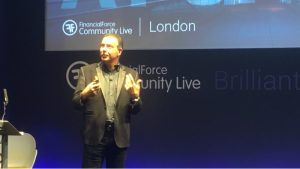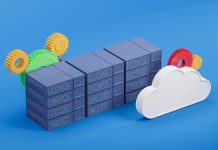Tod Nielsen is CEO of FinancialForce. He joined the company almost a year ago, taking up the reins from Jeremy Roche. He has worked in senior roles in Salesforce, Microsoft and VMWare.
Nielsen also led Heroku as CEO before its acquisition by Salesforce. His first CEO role was at Borland. ET spoke to Nielsen at Dreamforce.
ET: Who is your inspiration and why?
Tod Nielsen: Bill Gates. I’ve worked closely with him for a long time. He taught me the importance of clarity on vision, value proposition and the importance of transparency.
ET: How would you describe your leadership style?
Tod Nielsen: Empowering with accountability. I’m not a micro-manager. I’d say, “This is what I need you to do. Go do it and let’s set some milestones to check and see if we’re on track on not. If we’re not on track, let’s course-correct it and get on track.” I’m not volatile, I’m not a phone thrower or anything like that, but I would be as supportive, accommodating and empowering as possible.
ET: What are your personal challenges for the next 12 months?
Tod Nielsen: I’ve been in the industry 30 years and I can do a lot of the jobs and things myself. I have the tendency to say, “Oh, I’ll just do this myself and get it done,” instead of really empowering my teams or people to do it. In order to be successful I’ve got to let the teams do it and let them learn and grow instead of me just doing it for them.
ET: What was your darkest business day and how did you overcome it?
Tod Nielsen: I would say it was when I was CEO of Borland. It was a company that in the 80s and 90s was high-flying and then after Philippe left in ’95 there was ten years of just neglect. I came in ten years later to try to save it, and it was dark. There were days of no hope, with deteriorating culture, no clear strategy, competition everywhere, the rise of open source. The way I got through it was just starting to make some bold decisions and say, “Look, we’ve got to do everything we can and we’re going to go for it and no safety net.”
It was my first CEO role and it actually turned out to be a great role, because it forced me to be bold. My theory was if I went on and it was a mess, I could at least say, “I inherited it. The patient came in to me so sick. I tried everything possible and wasn’t able to save it.” But at least if I’m bold I can say, “I tried an acquisition, I tried to teach strategy, I spun out our Turbo Pascal and development tools group.” Looking back on it, it was a great learning experience, but in the middle of it there were some dark days.
ET: What was your proudest moment?
Tod Nielsen: The launch of Microsoft Access back in 1992. I worked on that product for five years and it took the industry over by storm. In those days it was Ashton-Tate with dBASE and Paradox and we were sort of a nobody and went from nobody to leader in the database world. I’m very proud of what we did there.
ET: Can you share a tip for other CEO’s trying to scale?
Tod Nielsen: I would say it’s one I learned from Marc Benioff. Once you get clarity and alignment on where you want to go, you can scale. But what happens with start-ups is they all think, “Hey, do the right thing or do no evil.” Unfortunately, that’s not a clear enough definition, so people aren’t necessarily aligned and they step on each other.
Marc has this thing he has created called a V2MOM, which is his management tool to align and make sure everyone in the organisation understands what they’re working on and how they work. It’s pretty straightforward and what a V2MOM stands for is vision, values, method or tactics, obstacles and metrics. It’s a simple, one-page document, and it allows you to set priorities in the language you’re going to do. That level of understanding is key.
The second tip I’d make, is in the IT world we have this concept of people, process and technology as a triangle and for the longest time in our industry everybody was focused on technology. I think we’re at a point now where technology is not the long pole in the tent. Dealing with people and process is always a harder issue than anyone thinks. When I look about every change or transformation I’ve led, the technology part of the transformation hasn’t been hard. It’s dealing with the people and process. That doesn’t matter if it’s your internally at your company, externally with customers or even in our economy at large.
ET: What’s the latest business book you’ve read, podcast you’ve listened to or your favourite book?
Tod Nielsen: Thank You for Being Late by Thomas Friedman. It’s a fantastic book. He makes this premise that the computer industry as we know it today didn’t really start until 2007. As a guy who was here for 30 years, I was like, “Well is that just throwing away my first 20 years? What’s the deal?” His premise is founded on Moore’s law which the industry has been living under Moore’s law since 1965. Humans don’t necessarily grasp the power of exponential growth and as Moore’s law has continued to improve the processing capabilities of computers every two years, we’re now to this point where things are happening incredibly fast.
What does that actually mean for our industry our way of life and the fact that we’re living in a world where self-driving cars are a reality and all that? It’s a really fascinating book to assess how we, as an industry, are going to change humankind and how we interact with each other and with technologies.
ET: What’s the worst and the best decision you ever made as a CEO?
Tod Nielsen: When it comes to the best decision, I’m a really good reader of people and I remember a quote that Jack Welch had: “If I look at my mistakes, the biggest mistake I made is I didn’t get rid of people fast enough.” And it’s like, “Holy cow, how could Neutron Jack say that?” But there’s a certain point when you know if someone’s leaning in with you and are they going to get there and make it happen, or do you say it’s time to move on?
The best decisions I’ve made have been where I said, “Hey, thanks so much, but we’re going to go a different direction and it’s time to move on.” Ironically the worst side of that is where I’ve held out belief and hope that that person can get there and at the end of the day they ended up being more of a detriment to the growth of an organisation.
ET: It’s easy to talk about the what you’re doing and the how you’re going to do it. What is Tod Nielsen’s why? Why are you doing what you’re doing?
Tod Nielsen: Every year I pick a word of the year and so my word of the year this year has been “impact”. Why I’m doing what I’m doing is because I want to have an impact on our industry, on people’s lives and make the world a better place. I subscribe to the camper’s theory of leave the campground in better state than when you found it. I’m working because I think I can positively impact people’s lives and the industry.
A great example is we have an employee in the UK who has a child with Down’s Syndrome. One of the things I didn’t realise is that in the UK if you’re pregnant and you find out that your child has Down’s Syndrome, you can actually abort it, up-until, like, the 39th-and-a-half week, which is amazing. So this employee said, “Hey, I want to get some awareness on this.” So I spent an hour playing at the park with her little boy, Elijah. Then she posted on LinkedIn and I posted on LinkedIn and I think we had a 100,000 hits or views of that experience. It’s an impact, which to me didn’t really cost much. It also had an impact on her. When I left the UK on Friday she said: “Look, thank you. You’ve really given me a clarity, a purpose in my life that I’m now going to be an advocate for Down’s Syndrome children.”
Those kinds of stories of impact, that’s why I work. I want to make the world a better place.
ET: What is your vision for FinancialForce?
Tod Nielsen: My vision for FinancialForce is we can be the leading company in this cloud ERP space, or this cloud back office systems space. I’m humble enough or self-aware enough to know we don’t have to do it all ourselves. I’m happy to say we’re going to do it with partners, we’re going to do it with brands, with an ecosystem. My background is all in platforms and ecosystem and I know you need to work with others. I’m humble enough to say I’m happy to do it with Salesforce and with our partners and with our customers to turn this into a collaborative effort.
ET: There’s a rumour that you’re looking into IPO within the next nine months. What needs to be done to achieve that?
Tod Nielsen: I don’t know about any timeframe. In our evolution IPO is certainly something that’s out there and that’s a milestone. Where I’m taking the company now, all the steps it would take to prepare for an IPO are the things you need to do to scale and grow as a company. What we’re doing really isn’t for that event as much as we’re doing it because I want to be a billion dollar plus company and to get there I’ve got to have a set of processes and scale and regular business and all the things that an IPO would require.
ET: What are the key business challenges in the next 12 months?
Tod Nielsen: I would say internally it’s just absorbing all the change. I came on in January and brought a fair bit of change into the organisation so digesting that is a challenge for us. Getting our customers aligned with our vision, how we’re going to work together and get everybody on the most-current release. One of the things that you run into with start-ups is you end up doing a bunch of bespoke code for customers. Cloud companies, by definition, are all about people being on the same release. So another business challenge or opportunity is for us to get all of our 1,400 customers on the current or the most current releases.
ET: What keeps you up at night?
Tod Nielsen: I spent the last six weeks in the UK working out of Harrogate. Throughout my career I’ve always travelled around the world, but I’ve never gone somewhere for six weeks, so I really understand the timezone challenges and the challenges of being a global company. What’s keeping me up at night right now is how to effectively manage and run a global company where timezones are challenging. How I can pull everybody together into a unified team.
ET: How do you approach the challenge of rapid growth while maintaining culture?
Tod Nielsen: That one, for me that’s a natural. I grew up at Microsoft and saw the incredible growth there and so growth is what I know how to do and hold things together. The way I typically do it is I just paint a vision of, “Here’s where we’re going.” If you backtrack from there, there’s the steps that are going to happen. So even though things will be crazy and noisy and chaotic at times, people will say, “Oh, we’re on track. This is the path we’re headed down and then we can get there.”
Another thing I did which has had great benefits, is we’ve rolled out this thing called Tiny Pulse. Tiny Pulse is a service that once a week asks one question to your employees. It ranges from a whole variety of questions like, “How happy are you at work? Will you be here a year from now? And give us some suggestions or feedback.” We rolled that out about six weeks ago. The feedback has been incredible. It’s been a great source where people can tell us what they like, what they don’t like and it’s all anonymous. Then I can read all the suggestions and reply to them anonymously.
It’s been this incredible openness where people are now feeling heard and a lot of the suggestions are super easy. Like some of them were, “We’re no longer serving Yorkshire Tea in the Harrogate office.”
ET: That’s a big deal.
Tod Nielsen: I was like, “Okay, done. I can fix that easy.” Or, “There aren’t enough forks in the lunchroom.” Okay, done. What’s been interesting to me is little things like that. When I hear about them and we can fix them, then the employees go, “Wow, they actually care and they listen.” So it causes the employees to lean in and then it helps build trust and people are like, “Okay, this is a great relationship. This isn’t a dictatorship. This is a partnership where we’re all trying to do the right thing, whatever that might be.”
ET: What are the key challenges, do you think, faced by the industry at the moment?
Tod Nielsen: One challenge facing the industry right now is trust. We’ve moved past phase one where initially you said “Cloud” and companies were saying, “Oh, I’m not going to put my stuff in the Cloud. I’m going to run my own data centre.” Customers have realised that they’re just not going to be able to put in the money they need to in order to protect their data centres. They realise now the cloud is great and is the only way for them to really and truly protect information.
The challenge that we haven’t tackled in the industry is around all of the knowledge that vendors have about consumers. At least in the US people like to pride themselves in, “Oh, I own my own identity.” Yet, if they knew what information Facebook or LinkedIn or Google or others had on them, they would probably go, “Oh my goodness. I had no idea.”
I illustrate this by saying to people: “Let’s both of us open up the same webpage. CNN or BBC or whatever and I guarantee that the ads on your browser will be different than the ads on mine.” It’s not random and when you actually start to peel apart that, people then begin to realise, “Oh my goodness. What’s known about me?” Then you have the adverse reaction of, “Well, I don’t want anyone to know anything.” But that’s not right and so there’s this trust spectrum that I think consumers and vendors in the industry need to figure out how to build.
ET: Do you think GDPR is going to have an impact on that discussion?
Tod Nielsen: I’m supportive clearly of the need for legislation, but our industry is really good with binary. Do this or don’t do that. We’re not good with ambiguous legislation around ‘give us your best effort.’ How do I tell an engineer best effort? I can tell them what to do, yes or no, and so I think that that’s gets to be a little bit crazy. The biggest surprise I’ve had with GDPR personally is I’m surprised how most customers, most companies, aren’t taking a real, proactive stance to jump on it. May 18 is not that far away and the penalties are 4% of your trailing revenue, so the penalties are ginormous. And yet most customers I talk to are like, “Ah, we’ll get to that next year.” And I’m like, “You know, it might take you a little bit of time to get there. You need to jump on this.”
For our industry it can potentially be our Y2K event. One of the things I learned when I was over in the UK is I didn’t realise that employees can also say, “I want to be forgotten.”
ET: You took the brave decision to move ACM from your core deliverable to a partner vendor. What led you to make that decision?
Tod Nielsen: My fundamental belief is you’ve got to focus on what you’re going to be great at. I tell the exaggerated joke that when I started I asked what was our roadmap or what were we great at. And the roadmap was “imagine every feature in every ERP and that’s our roadmap”. I said, “That’s not a roadmap, that’s a death wish. We’re not going to be average at everything and so we have to focus our resources on what we’re going to be great at.” When I looked at our HCM offering, when the team thought they were competing with Workday, my response was, “Look, you’re not competing with Workday, regardless of what you think. So let’s just make the right call and focus on what we do best.” ADP has been a great partner for us in the US. Internationally I’ve got a little bit of work to do.”
ET: What’s the one question you’d like to ask another CEO to answer?
Tod Nielsen: It would be tell me about the positive surprise that an employee or a group of employees did that you knew nothing about.
ET: Can you answer that question yourself?
Tod Nielsen: For me, right now, I would say it’s FinancialForce For Good. This is about making an impact and giving our time and money back to our communities. Our UK office did an incredible job in the month of October raising money and doing things for this organisation called, St Michael’s Hospice. It made me super proud as an employer and as a human to see all the things that were done that literally I didn’t have to push or make happen. I think that organisation in Harrogate will be impacted positively because of us and that gets back to my why I work. It makes me feel like it’s a good thing.
ET: Thank you very much Tod.



























